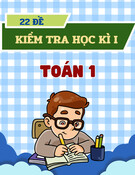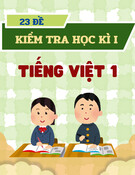Ở Ụ Ạ Ề Ọ
Ọ Ơ Ả S GIÁO D C VÀ ĐÀO T O ĐĂK LĂK ƯỜ Ễ Ừ TR NG THPT NGUY N VĂN C ệ Ỳ Ể Đ KI M TRA H C K II NĂM H C 20162017 Ế MÔN: TI NG ANH 11 BAN C B N ờ Th i gian làm bài: 45 phút ắ (40 câu tr c nghi m)
ề Mã đ thi 102
ọ
ớ
H , tên thí sinh:..................................................................... L p: .............................
Read the following passage and mark the letter A, B, C, or D to indicate the correct answer to each of the questions from 1 to 5.
BODY LANGUAGE AND CULTURAL DIFFERENCES
The body language people use often communicates more about their feelings than the words they are saying. We use body movements, hand gestures, facial expressions, and changes in our voice to communicate with each other. Although some body language is universal, many gestures are culturally specific and may mean different things in different countries.
If you want to give someone the nod in Bulgaria, you have to nod your head to say no and shake it to say yes – the exact opposite of what we do! In Belgium, pointing with your index finger or snapping your fingers at someone is very rude.
In France, you shouldn’t rest your feet on tables or chairs. Speaking to someone with your hands in your pockets will only make matters worse. In the Middle East, you should never show the soles of your feet or shoes to others as it will be seen as a grave insult. When eating, only use your right hand because they use their left hands when going to the bathroom. In Bangladesh, the ‘thumbsup’ is a rude sign. In Myanmar, people greet each other by clapping, and in India, whistling in public is considered rude.
In Japan, you should not blow your nose in public, but you can burp at the end of a meal to show that you have enjoyed it. The ‘OK’ sign (thumb and index finger forming a circle) means ‘everything is good’ in the West, but in China it means nothing or zero. In Japan, it means money, and in the Middle East, it is a rude gesture.
Câu 1: It is mentioned in the passage that many gestures ______.
A. are not used to communicate our feelings B. can be used to greet each other in public C. may mean different things in different countries D. are used in greeting among men and women Câu 2: People nod their head to say no in ______.
A. France B. Japan C. Belgium D. Bulgaria
Câu 3: In the Middle East, people do not use their left hands for eating because they use their left hands ______.
A. to clean their tables and chairs C. to put in their pockets B. when preparing the meal D. when going to the bathroom
Câu 4: Which of the following is NOT true according to the passage? A. In Belgium, snapping your fingers at someone is very rude. B. In Myanmar, people greet each other by clapping. C. In China, the ‘OK’ sign means money. D. In France, people shouldn’t rest their feet on tables. Câu 5: The word “others” in paragraph 3 refers to ______.
A. other people B. other feet C. other shoes D. other soles
ề
Trang 1/4 Mã đ thi 102
Mark the letter A, B, C, or D to indicate the sentence that is closest in meaning to each of the following questions.
Câu 6: The birthday party was noisy. We went to it
A. The birthday party which we went to it was noisy B. The birthday party was noisy which we went to C. The birthday party we went to it was noisy D. The birthday party we went to was noisy
Câu 7: They said that Paula had quit five jobs before working for us. A. It was said that Paula had quit five jobs before working for us. B. Paula worked for us then she quit five other jobs. C. Paula said that she had quit five jobs before working for us. D. They said that five jobs were quit by Paula before working for us.
Câu 8: They expect that his father will come back home. A. His father will be expected to come back home. B. His father is expected to come back home. C. His father was expected to be come back home. D. It was expected that his father will come back home.
Câu 9: “If I were you, I would do morning exercise regularly,” said John.
A. John advised me to do morning exercise regularly. B. John prevented me from doing morning exercise regularly. C. John congratulated me on doing morning exercise regularly. D. John asked me to do morning exercise regularly.
Mark the letter A, B, C, or D to indicate the underlined part that needs correction in each of the following questions. Câu 10: Your grandfather could speak five languages, could he? B. your D. languages A. could he C. speak
Câu 11: It was in July which Mary graduated from college.
A. from B. It was C. which D. in
Câu 12: The young man whose I wanted to see was away on holiday
C. to see A. whose B. on D. The
Câu 13: He was respected by the people with whom he worked with. C. was respected A. worked B. with D. whom
Read the following passage and mark the letter A, B, C, or D to indicate the correct word or phrase that best fits each of the numbered blanks from 14 to 18. The Red Cross is an international humanitarian agency with national affiliates in almost every country in the world. The Red Cross movement began with the founding of the International Committee for the Relief of (14)______ Wounded in 1863 (now the International Committee of the Red Cross); it was (15)______ to care for victims of battle (16)______ wartime, but later national Red Cross societies were created to aid in the prevention and relief of human suffering generally. Its peacetime activities include first aid, accident prevention, water (17)______, training of nurses' aids, maintenance of maternal and child welfare centers and medical clinics, blood banks, and numerous (18)______ services. The Red Cross is the name used in countries under nominally Christian sponsorship; the Red Crescent (adopted on the insistence of the Ottoman Empire in 1906) is the name used in Muslim countries. D. an Câu 14: A. one D. established Câu 15: A. done D. to Câu 16: A. on C. a C. found C. before B. the B. set B. in
ề
Trang 2/4 Mã đ thi 102
B. safely B. others C. safety C. other D. safe D. another
D. pleased D. facility C. great C. aquatic B. beach B. added
Câu 17: A. safer Câu 18: A. the other Mark the letter A, B, C, or D to indicate the word whose underlined part differs from the other three in pronunciation in each of the following questions. Câu 19: A. lead Câu 20: A. attract Mark the letter A, B, C, or D to indicate the word(s) CLOSEST in meaning to the underlined word(s) in each of the following questions.
Câu 21: All of the competitors are ready for the first round.
A. participants B. coordinators C. enemies D. cooperators
Câu 22: He advised me to practise playing the guitar regularly.
A. freely B. frequently C. commonly D. completely
Mark the letter A, B, C, or D to indicate the correct answer to each of the following questions. Câu 23: Only 489 athletes from 11 nations took part ___________ the 1st Asian Games.
A. in B. on C. at D. of
Câu 24: The people __________ in this village should be aware of the coming earthquakes D. who living A. are living B. living
C. to be living Câu 25: He was the last person __________ the top of the mountain C. to be reach B. who reaching A. reaching D. to reach
Câu 26: If I ………..English when I was at university, I ……………for that job.
A. learnt /would apply C. learnt/would have applied B. had learnt/could apply D. had learnt/could have applied
Câu 27: My uncle is very good at______________ people singing with his guitar.
A. to accompany B. accompany C. accompanied D. accompanying
Câu 28: You are going to come to the party, ____?
A. aren't you B. will you C. won't you D. do you
Câu 29: The factory is said _______ in a fire two years ago.
A. being destroyed C. to destroy B. to have been destroyed D. to have destroyed
Câu 30: Jack has a large ____ of foreign coins.
A. collector B. collective C. collection D. collecting
Câu 31: The teacher with _________ we studied last year no longer teaches in our school
A. who D. whom
C. that B. Ø Câu 32: Have you read any novels ..............by Shakespeare? C. wrote A. written B. writes D. writing
Câu 33: He is said ...................108 years old.
A. be B. to be C. was D. is
Câu 34: The woman ____________ you met this morning is my teacher.
A. x C. where D. whose
C. would have gone D. would go
B. which Câu 35: If I had time, I _____ to the beach with you this weekend. B. will go A. will have gone Câu 36: It was on weekends ____________
A. that they often have parties C. who they often had parties B. that they often had parties D. which they often had parties
ề
Trang 3/4 Mã đ thi 102
Câu 37: No one can avoid______ by advertisements.
A. to be influenced B. having influenced D. influencing
C. being influenced " Câu 38: "Wow! What a nice coat you are wearing!" "
A. I like you to say that. C. Thanks. My mother bought it for me. B. Yes, of course. It's expensive. D. Certainly. Do you like it, too?
Mark the letter A, B, C, or D to indicate the word that differs from the other three in the position of the primary stress in each of the following questions. Câu 39: A. passenger Câu 40: A. potential C. generate C. cosmonaut B. excursion B. official D. gravity D. biology
Ế H T






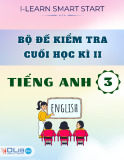
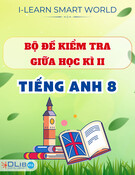
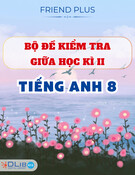
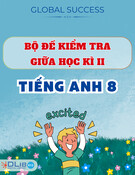
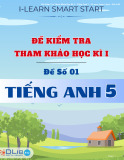
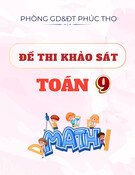
![Đề thi Tiếng Anh có đáp án [kèm lời giải chi tiết]](https://cdn.tailieu.vn/images/document/thumbnail/2025/20250810/duykpmg/135x160/64731754886819.jpg)
